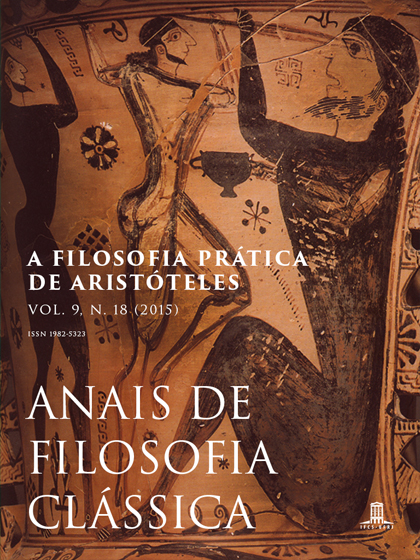Os direitos humanos e a alternativa da ética das virtudes
DOI:
https://doi.org/10.47661/afcl.v9i18.3241Palavras-chave:
Aristóteles, ética, virtudeResumo
O sistema dos direitos humanos atingiu um grande prestígio nas últimas décadas. Muitas preocupações morais são descritas neste tipo de linguagem para que possam encontrar espaço e legitimidade nos debates internacionais. Essa hegemonia, entretanto, é acompanhada por uma série de problemas, uns de natureza conceitual, devido a dificuldade de definir o que são direitos humanos, e outros de natureza prática, dada a significativa resistência internacional que os direitos humanos enfrentam. Este artigo possui dois objetivos relacionados a essas dificuldades. Em primeiro lugar, sugiro uma definição teórica para os direitos humanos a partir da teoria moral kantiana e, em segundo lugar, critico esta perspectiva por meio da ética da virtude aristotélica. Argumento que as dificuldades dos direitos humanos são inerentes à sua estrutura moral, de tipo deontológica. Por fim, o artigo propõe que a ética da virtude aristotélica pode solucionar muitos dos problemas encontrados no sistema de direitos humanos.
Referências
ANNAS, J. Being virtuous and doing the right thing. In: SHAFER-LANDAU, R. (ed.) Ethical theory: an anthology. Oxford: Wiley-Blackwell, 2013.
ANSCOMBE, G. Modern moral philosophy. Philosophy, v. 33, n. 124, pp. 1-19, 1958.
ARISTÓTELES. Nicomachean ethics. Translated and edited by Roger Crisp. Cambridge: Cambridge University Press, 2014 (2000).
BEITZ, C. What human rights mean. Daedalus, v. 132, n. 1, pp. 36-46, 2003.
BENTHAM, J. Anarchical fallacies. In: WALDRON, J. (ed.) 'Nonsense upon stilts': Bentham, Burke, and Marx on the rights of man. London: Methuen, 1987. pp. 46-49.
BROWN, C. The 'practice turn', phronesis and classical realism: towards a phronetic international political theory?. Millennium: Journal of International Studies, v. 40, n. 3, pp. 439-456, 2012.
BUNCH, C. A feminist human rights lens. Peace Review, v. 16, n. 1, pp. 29-34, 2004.
CARANTI, L. Kant's theory of human rights. In: CUSHMAN, T. (ed.) Handbook of human
rights. London and New York: Routledge, 2012. pp. 35-44.
DESTRÉE, P. Como demonstrar o próprio do homem? Por uma leitura 'dialética' de EN, I,6. In: ZINGANO, M. (org.) Sobre a ética nicomaqueia de Aristóteles: textos selecionados. São Paulo: Odysseus Editora, 2010. pp. 379-404.
ELVEY, K. Developing a compromise: the case for universal human rights from a cultural perspective. Human Rights Quarterly, v. 34, n. 3, pp. 919-921, 2012.
FÉRON, H. Human rights and faith: a 'world-wide secular religion'? Ethics & Global Politics, v. 7, n. 4, pp. 181-200, 2014.
FOOT, P. Morality as a system of hipothetical imperatives. The Philosophical Review, v. 81, n. 3, pp. 305-316, 1972.
______. Natural goodness. Oxford: Clarendon Press, 2001.
GRIFFIN, J. On human rights. New York: Oxford University Press, 2008.
LANG, A. Punishment, justice and international relations: ethics and order after the cold war. London and New York: Routledge, 2008.
NUSSBAUM, M. Capabilities and human rights. Fordham Law Review, v. 66, n. 2, pp. 273-300, 1997.
RAWLS, J. Collected papers. Edited by Samuel Freeman. Cambridge: Harvard University Press, 1999.
REATH, A. Kant's conception of autonomy of the will. In: SENSEN, O. (ed.) Kant on moral autonomy. New York: Cambridge University Press, 2013. pp. 32-52.
SELIGMAN, M. et al. Shared virtue: the convergence of valued human strengths across culture and history. Review of Genereal Psychology, v. 9, n. 3, pp. 203-213, 2005.
SEN, A. Human rights and Asian values. New York: Carnegie Council on Ethics and International Affairs, 1997.
______. Elements of a theory of human rights. Philosophy & Public Affairs, v. 32, n. 4, pp. 315-356, 2004.


